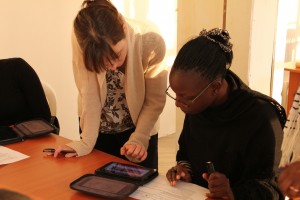
A-GAMES seeks to better understand how teachers are using digital games to assess student skills. //Photo by Global Partnership for Education
The recent launch of SimCityEDU and its major data-analyzing assessment engine has drawn a lot of media attention, but how are other learning games being used to gauge students’ mastery of a subject? Answering that question is the goal of a new project, A-GAMES, or Analyzing Games for Assessment in Math, ELA/Social Studies, and Science.
A-GAMES represents a partnership between Barry Fishman of the University of Michigan School of Education and School of Information and Jan Plass and Michelle Riconscente of the Games for Learning Institute at New York University. The team is also collaborating with BrainPOP, that will provide access to games through their GameUp platform. According to their website, the study “aims to document the various ways teachers use educational games for assessment purposes, identify game features that support good assessment practices, and generate assessment-related recommendations for the design of educational games.”
For Fishman, the project aims to bring teachers’ perspectives and real-world experiences with games into the design conversation.
“One of the most promising aspect of games is that they often have built-in assessment engines. But what isn’t clear is whether the way game designers think about assessment matches with the way teachers think about assessment, especially formative assessment, which is meant to support and advance learning,” he said.
“By studying how teachers make use of various assessment features in games, and by better understanding the barriers that teachers face in using assessment effectively, we hope to provide information that advances the state of the art for real-world practice.”
The project will begin with a survey of teachers using games in the classroom to gauge the current ways in which teachers are using digital games to assess their students’ knowledge.
The survey seeks to gather information from a range of teachers in different grade levels and geographic areas, and is open to any teacher in the United States.
“With the survey, we want to establish a broad baseline of information that relates teachers’ formative assessment practices to their game-based educational practices. We will also use the survey to identify teachers for follow-up case studies to explore their use of formative assessment features in games in greater depth,” Fishman said.
The survey is available now at Consortium for Research and Evaluation of Advanced Technologies in Education. For firms interested in how teachers are using their games or other assessment tools, the survey marks an opportunity for game developers to get a better understanding of how the current array of games are being used in the classroom.
Gamesandlearning.org will report on the initial survey findings in the new year and be tracking the A-GAMES work throughout 2014.
Once the survey is complete, Fishman and his team aim to conduct a series of case studies in the New York City area, focusing on grades 5-8.
Editor’s Note: A-GAMES is made possible by support from the Bill & Melinda Gates Foundation, which also supports the production of gamesandlearning.org.
